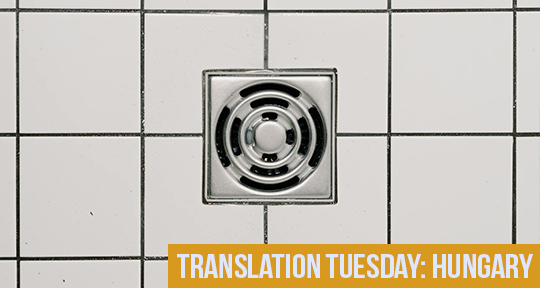This Translation Tuesday, we are proud to present a brilliant vignette from the innovative mind of Hungarian author Mari Klein, who also translates her own work into English. Dropping us in media res in this tableau of a woman crouching on a bathroom floor as she gasps for her dying breath—the ignominious cause revealed only near the very end—Klein not only gives us a masterclass in the depiction of consciousness but also a glimpse into her huge gifts as a mordantly funny writer.
(Then she groped on all fours on the worn bathroom floor, along the bathtub, under the washing machine, behind the laundry basket, but couldn’t find it: half a pair of the pretty green stone earrings were gone; there goes the family heirloom, she thought, wiping the blood that had clotted on her neck. But the snake bracelet―the clasp was broken and it was only cheap trinket gold anyway―she couldn’t get rid of, even though she threw it in the toilet and flushed it three times: the blue-purple marks of the scales would have to be worn and concealed on her wrist for a long time to come.)
She opened St. Peter’s Umbrella, to be read by Wednesday, and turned to the last page: “. . . a whisper, it sounded like the buzzing of a fly. Poor child!” she read, but suddenly slammed the book shut, crumpling the dust jacket in her hands, clenching it so tightly that her knuckles turned white. Then she gently stroked the letters on the cover, as if to apologise, and put the book back on the bedside table, next to the polka dot mug. With her finger she stirred the cold cocoa: the pale swirl swallowed the skin and then, as it weakened, spat it back to the surface. She licked her finger: the milk had gone sour. Titi said her daddy made her cocoa every night too.
(From the white vinyl apron on the drying rack above the bathtub, she counted: water dripped on every fourth. The heavy body was sweating, panting, reeking of booze and garlic; but then all she could see was the fly on the mirror, rubbing its feet, buzzing, moving back and forth a few centimetres every now and then.)
She stepped to the window. The bats that crashed against the mosquito net fell in horror and rose in misery; perhaps they would slowly find their way home and hide in the crevices of the blocks or in the attic of the presbytery, for the city was awakening: from somewhere far away, through the holes of the net, almost visible, as if alive, the bitter smell of black coffee coiled, a van growled in front of the grocery store, the tram turned the corner with a weak, plastered mouth scream, in the park the yapping of dogs dodged around the trees, and foamy water splashed on the pavement, the white clouds reflected in it, cavorting for the jays and magpies; but above the entrance a bell rang, a butcher stepped out of the shop and crushed the dance with his rubber boots.
(If she hadn’t gone to the bathroom, but instead held it back; if she had gone back to the bedroom instead, having seen the light on, assuming it was occupied; if she had cuddled up next to Titi, holding her hand under the blanket, stroking her flushed face, because that was all she had to do, that was why she was taken there in the evening: to comfort the poor little orphan; but the door was ajar, so she pushed it open: from the mirror, not yet soiled by the little fly, Titi’s daddy smiled at her as he urinated in the washbasin, then winked.)
She knelt down beside the bed, an orange bucket had been set there, but the moment the sickness approached her, the air got stuck in her throat, just like the broken toothpick in Titi’s mother’s; it had been accidentally baked into a slice of Gerbeaud cake, and the confectioner, without knowing it or wanting to, had begotten a tragedy and incited the devil to ring the doorbells of three families in succession. And she swallowed, for with the onset of nausea her urge had completely dried up, she struggled, wishing that the veins in her forehead would not bulge, that her gullet would not constrict, that God would please spare her, as she kept saying, for in the back of her head and in her eyes she felt that all life was about to snap. A cold, deadly sweat broke out on her spine and in the blond hairs above her mouth; and she held on to the edge of the orange bucket in vain, the relief she both dreaded and wished for did not come: this thing will always be stagnate in her stomach, fester in her bowels.
(Titi’s daddy used to be so nice to her.)
Translated from the Hungarian by Mari Klein
Translator’s note: St. Peter’s Umbrella (Szent Péter esernyője) by Kálmán Mikszáth is an important novel in Hungarian literature, required reading in schools at the age of 12-13 (which suggests the age of the character), and the line quoted from the book is taken from an existing translation by B. W. Worswick, available online here.
Mari Klein is a Hungarian writer and literary translator. Her first translation, an essay by Virginia Woolf, has appeared in 1749, an online journal of world literature in Hungarian, with more to come. She has recently graduated from the Pázmány Péter Catholic University in Budapest, Hungary, with a degree in literary translation, and also participated in an Irish Poetry Translators Masterclass, generously supported by the Embassy of Ireland. Klein writes short stories and is currently working on her first novel. She lives in Budapest.
*****
Read more from Translation Tuesdays on the Asymptote blog:

